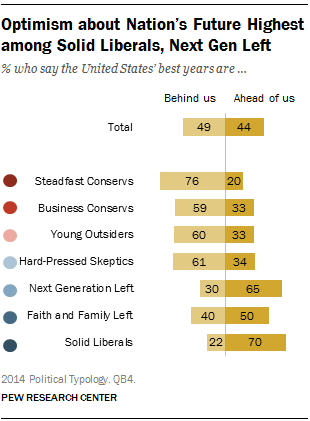
The typology groups differ markedly in their attitudes about America’s future, its standing in the world and the factors behind the nation’s success.
The public generally is divided about the nation’s future: 49% think the country’s best years are behind us, while 44% say the best years lie ahead.
Pessimism about the country’s future is most prevalent among Steadfast Conservatives – fully 76% believe that “the country’s best years are behind us,” as do 59% of Business Conservatives. However, a negative outlook extends to the middle of the typology – 61% of Hard-Pressed Skeptics and 60% of Young Outsiders say the U.S. has already seen its best years.
By contrast, Solid Liberals and the Next Generation Left say the best is yet to come for the United States. Wide majorities of both groups (70% and 65%, respectively) say the country’s best years lie ahead. By a narrow margin, the Faith and Family Left also are more likely to say the best years are ahead (50%) than in the past (40%).
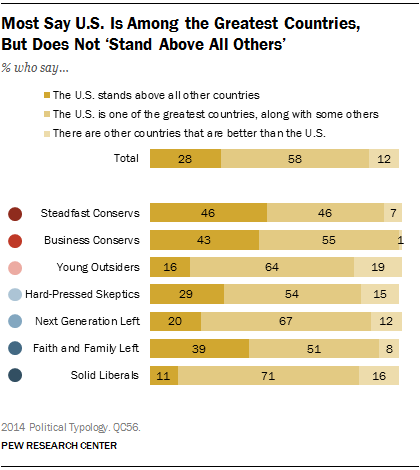
While there are divides in views over whether the country’s best years are in the past or future, large majorities of all groups see the U.S. as either one of the greatest countries in the world or the greatest country in the world.
Overall, 58% say the U.S. is one of the greatest countries in the world, along with some others; 28% say the U.S. stands above all other countries. Just 12% say there are other countries that are better than the U.S.
Belief that the U.S. stands alone in the world is most prevalent among Steadfast Conservatives, Business Conservatives and the Faith and Family Left. Though they see the country’s best years in the past, Steadfast Conservatives are as likely to say the U.S. stands above all other countries (46%) as say the U.S. is one of the greatest countries in the world, along with some others (46%).
Many Business Conservatives also say the U.S. stands alone as the best country (43%), though more (55%) say it is one of the greatest countries in the world, along with some others. Among the Democratically-oriented groups, the Faith and Family Left are the most likely to say the U.S. stands above all other countries: 39% say this, though a greater share (51%) says the U.S. is among the greatest countries.
Across all other groups, far more say the U.S. is one of several of the greatest countries in the world, rather than the one country standing above all others. For example, 67% of the Next Generation Left see the U.S. as one of the greatest countries, while 20% say it stands above all others.
Why Has the Country Been Successful?
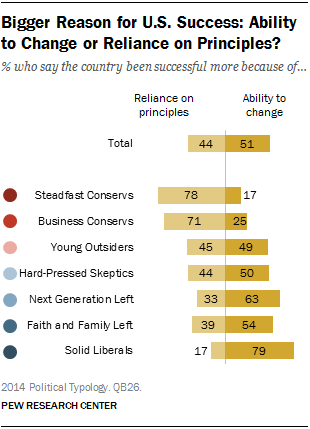
There are greater divisions of opinion when it comes to the question of what explains the past success of the United States, with differences within and across partisan groupings.
Overall, 51% say the country has been successful more because of its ability to change, while 44% say it is more because of its reliance on long-standing principles.
Both Steadfast and Business Conservatives see reliance on long-standing principles as the main reason the United States has been successful. Large percentages of both groups (78% and 71%, respectively) take this view.
However, the Young Outsiders are more divided: About as many say the country has been successful because of its ability to change (49%) as because of its reliance on principles (45%). Opinions are similar among the Hard-Pressed Skeptics (50% ability to change vs. 44% reliance on principles).
Solid Liberals overwhelmingly say the country has been successful because of its ability to change (79%-17%). The Next Generation Left also holds this view by a wide 63%-33% margin. Roughly half of the socially conservative Faith and Family Left (54%) credit the nation’s ability to change, while 39% attribute the nation’s success to its reliance on long-standing principles.
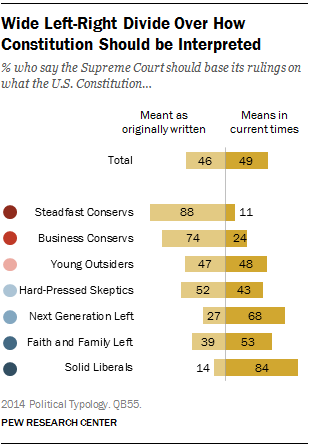
The theme of change versus tradition surfaces in views of a very different question – whether the Supreme Court should base its rulings on an understanding of what the Constitution meant as it was originally written or on what the Constitution means today.
The two most conservative groups stand out for their strong belief that the court should base its rulings on an understanding of the Constitution as originally written. Fully 88% of Steadfast Conservatives support “constitutional originalism,” as do 74% of Business Conservatives – by far the highest percentages of any of the typology groups.
Solid Liberals take the opposite view. More than eight-in-ten (84%) say the Supreme Court should base its understanding of the Constitution on what it means today, not on what it meant when it was originally written. And about two-thirds (68%) of the Next Generation Left also say the court’s rulings should be based on what the Constitution means today. On this question, both Hard-Pressed Skeptics and Young Outsiders are divided.
Views of the Federal Government
Pew Research surveys have documented the historic decline in trust in government over recent years, and the Typology survey finds that trust in government remains mired near record lows. Just 24% say they can trust the government in Washington to do what is right just about always or most of the time; far more (75%) say they trust government only some of the time or never.
Majorities of all typology groups express low levels of trust in government. Distrust is especially acute among the Republican-oriented groups. For example, 93% of Steadfast Conservatives trust the government only some of the time or never. The Next Generation Left are among the least negative groups, yet more still say they trust the government only sometimes or never (59%) than most of the time or always (40%).
Alongside low levels of trust, most Americans (62%) say they feel frustrated with the federal government, while another 19% say they are angry; just 17% say they feel basically content with the government.
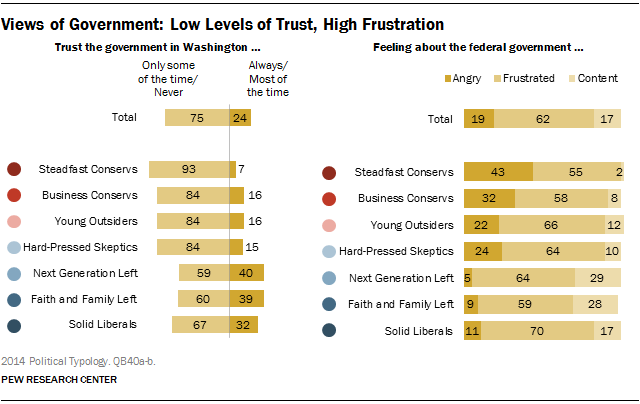
While all groups are frustrated with government, Steadfast Conservatives are the most likely to say they are angry: 43% say they feel this way toward government. By contrast, just 11% of Solid Liberals, 9% of the Faith and Family Left and 5% of the Next Generation Left are angry with government.
Many Business Conservatives (32%) say they are angry with the federal government, though far more describe themselves as frustrated (58%).
Similar percentages of Hard-Pressed Skeptics (24%) and Young Outsiders (22%) say they are angry with government. For both groups, this places them somewhat out of step with the groups at the poles of their partisan leanings: Young Outsiders are about half as likely to be angry with government as Steadfast Conservatives; Hard-Pressed Skeptics are about twice as likely to express anger with the federal government as Solid Liberals.
Defining Government’s Role
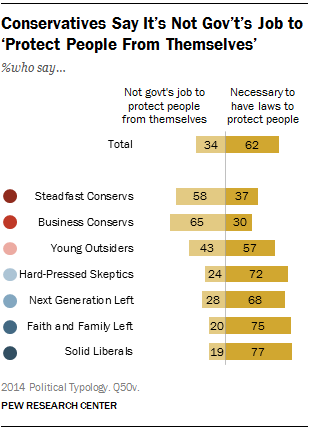
Most Americans say that sometimes laws are necessary to protect people from themselves (62%), while 34% say that it’s not the government’s job to protect people from themselves. Most typology groups say it is sometimes necessary to have laws to protect people from themselves, including 57% of Young Outsiders – a group that generally holds limited views on what the government can and should be doing.
Business Conservatives (65%-30%) and Steadfast Conservatives (58%-37%) are the only two groups where majorities say it’s not the government’s job to protect people from themselves.
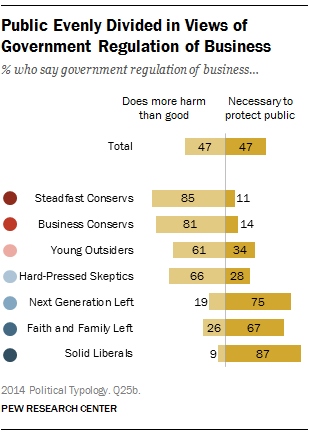
Yet the public has divided opinions about the government’s regulation of business, and large majorities of the typology’s middle groups – Hard-Pressed Skeptics (66%) and Young Outsiders (61%) – say regulation does more harm than good.
Anti-regulation views are a defining feature of the two most Republican typology groups. Fully 85% of Steadfast Conservative and 81% of Business Conservatives say that government regulation of business does more harm than good.
By contrast, there is strong support for government regulation of business among Solid Liberals (87% say regulation is necessary to protect the public interest), the Next Generation Left (75%) and the Faith and Family Left (67%).